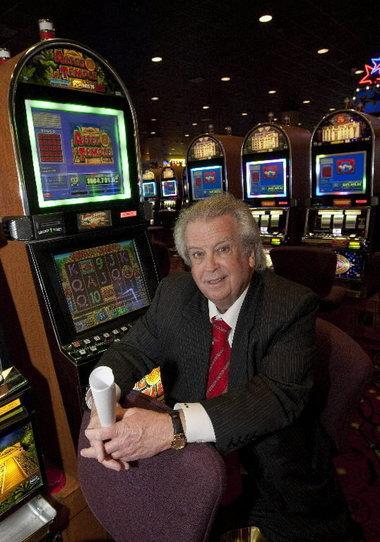
Milton McGregor at
VictoryLand casino
The electronic-bingo machines at VictoryLand are legal, and we can say that with certainty because of a simple provision of law that might best be stated as follows: The constitution trumps a state statute.
Most students probably learn that on about the third day of law school. Luther Strange and his associates must have been absent that day because they persist in challenging a legal concept that is impervious to challenge. Former Governor Bob Riley and his legal advisers also must have been out of the loop because they spent the last two years of his administration (2008-10) conducting groundless legal actions against bingo facilities that cost taxpayers an estimated $4 million.
Strange has picked up where Riley left off, but as someone with a law degree, the attorney general should know the multiple anti-bingo raids of the past five years or so have no basis in law.
Here is how the legal argument stands at the moment: Strange repeatedly has claimed in court documents that the machines at VictoryLand meet the definition of an illegal slot machine under state law. An Alabama Supreme Court ruling from earlier this year quoted one of Strange's staff members making this argument in an affidavit seeking a search warrant to raid VictoryLand. Here is language straight from the affidavit:
Based upon my experience and understanding of [§] 13A-12-20(10), [Ala. Code 1975,] each machine observed . . . at the Casino met the definition of a slot machine.
The second prong of Strange's primary claim argues that the VictoryLand machines constitute illegal gambling devices under state law. Again, quoting from the affidavit:
Furthermore, it is my opinion the machines inside the Casino fit the description of a Gambling Device as outlined in [§] 13A-12-20(5) [, Ala. Code 1975].
As you can see, the Strange argument is built on two provisions from the Code of Alabama, which is statutory law. But VictoryLand owner Milton McGregor and his lawyers make the following fundamental argument: "Amendment 744 to the Alabama Constitution specifically permits bingo in Macon County and does not limit the forms of bingo which may be operated."
A plain reading of Amendment 744 shows that the McGregor team is correct, with the sheriff designated to "promulgate rules and regulations for the licensing and operation of bingo games within the county." Nowhere is a role designated for the attorney general--or the governor, for that matter--to determine what forms of bingo can be played in Macon County.
Perhaps McGregor's strongest argument, however, comes from a simple legal concept that is spelled out across Alabama state law. Here is one way to put it: If a conflict exists between a state statute and a constitutional amendment, the Alabama Supreme Court has held that the constitutional amendment controls and takes precedence over the statute.
In other words, the constitution trumps a statute. And a case styled Chorba-Lee Scholarship Fund Inc., et al v. Sheriff Mike Hale, et al, 60 So. 3d 279 (2010) is one of many cases that spell it out:
'Undeniably, the legislature cannot enact a statute that conflicts with the Constitution, that is, that prohibits that which is permitted by the Constitution or that permits that which is prohibited by the Constitution.'" Opinion of the Justices No. 373, 795 So.2d 630, 632 (Ala.2001) (quoting City of Birmingham v. Graffeo, 551 So.2d 357, 361-62 (Ala. 1989)).
If no genuine controversy exists regarding electronic bingo in Macon County, why has Luther Strange started one? Why did former Governor Bob Riley, before Strange, start a crusade against non-Indian gaming that largely was not based in the law? It has been widely reported that Strange and Riley have received campaign support from Indian gaming interests--the Choctaws in Mississippi and the Poarch Creeks in Alabama--so a reasonable citizen might figure that the bogus controversy was generated for political purposes that have nothing to do with the law.
When Strange protested the issuance of a liquor license late last year at the VictoryLand casino, McGregor attorneys Joe Espy and John M. Bolton filed a response that put the attack on non-Indian gaming in perspective:
Perhaps General Strange believes the ends justify the means when it comes to non-Indian gaming. It is clear that the concerted and illegal attacks a former Governor and General Strange made on VictoryLand and others have benefited the Indian casino operators who have lavished campaign cash on them. For example, the Poarch Creek casinos, who have a tax-free monopoly in Alabama, have experienced the fastest growth in revenues of any Native American casino in the United States--a staggering 61%--while revenues at Indian gaming facilities decreased nationwide. In fact, on July 11, 2012, the Poarch Creek Indians announced a $246 million expansion project at its Creek Casino Riverside in Wetumpka. And the Choctaws opened a new casino in Mississippi near the Alabama border in December 2012 after VictoryLand ceased operating electronic bingo games.
We cannot be sure whether General Strange's "protest" is part of his ongoing effort to block non-Indian casinos from operating legal games in Alabama, if it is merely a public relations stunt to give the impression that he is acting in the manner desired by his mentor (Bob Riley) and Native American benefactors, of if it is intended to promote his future political aspirations. What is clear is that . . . there is no legal basis for considering his request.The bottom line? Given the simple holding that a constitutional amendment trumps a state statute, it's hard to see legal justification for the actions Strange and Riley have taken toward non-Indian gaming in Alabama. That suggests they have been playing games with the people of Alabama, using our tax dollars to promote their political aspirations. How long will citizens continue to tolerate it?
